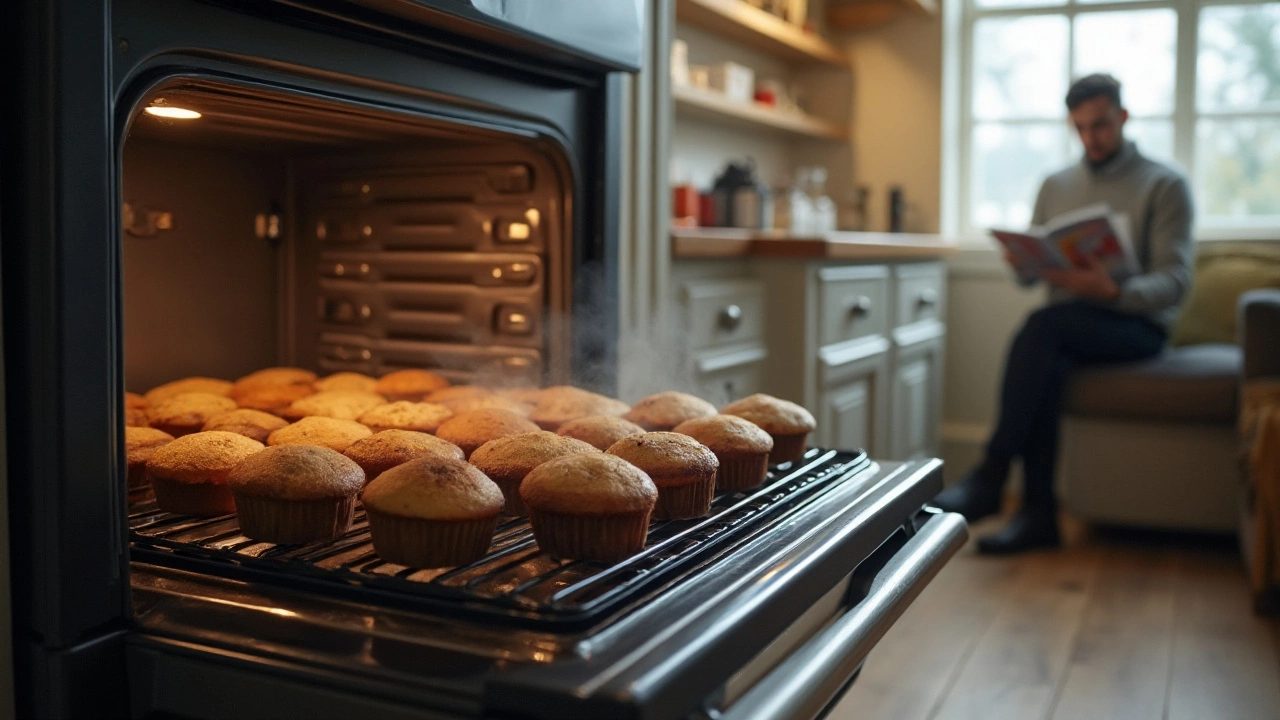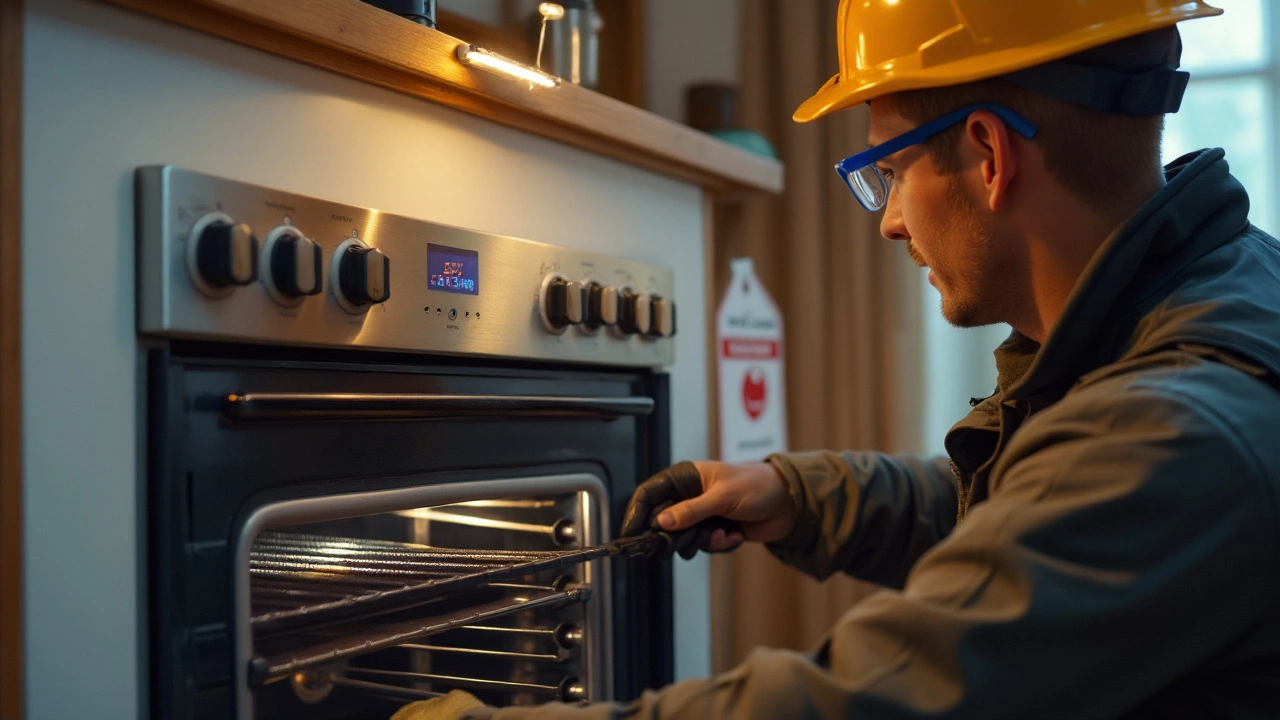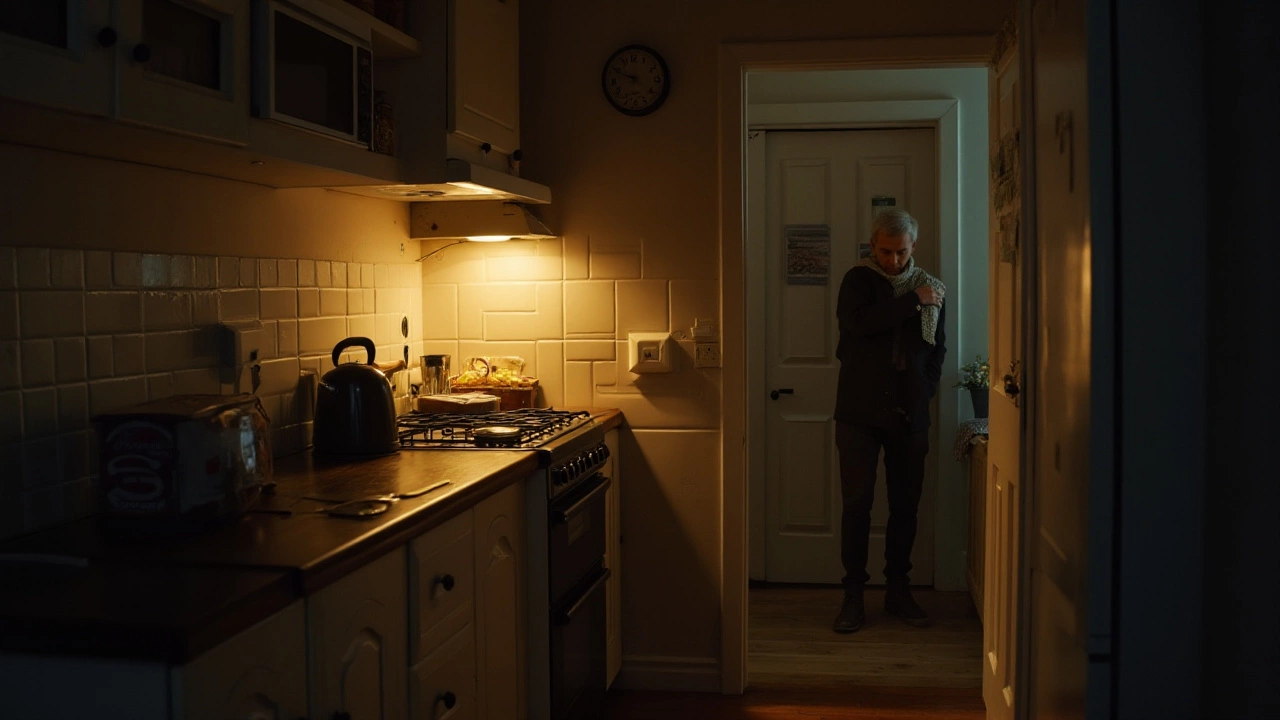
- 25 Aug 2024
- Gideon Thornton
- 0
There's something splendid about the aroma of a homemade pie baking in the oven or a comforting roast slowly cooking to perfection. But when your trusty gas oven starts acting up, especially when the culprit is the igniter, those culinary dreams can come to a simmering halt. Knowing how to spot a faulty gas oven igniter can be a real game-changer.
The igniter is crucial for starting the gas flow to heat your oven. A malfunctioning igniter may end up with no heat, uneven cooking, or even a refusal to start altogether. Each problem comes with its own set of clues, and understanding these symptoms can help you determine when a DIY fix is possible or if it's time to consult a professional.
Recognizing these signals early not only keeps your kitchen appliance running smoothly but also ensures the safety of your household. So, let's dive into the world of gas oven igniters and unveil the secrets that lie with this little but significant part of your oven.
- Symptoms of a Bad Gas Oven Igniter
- Delayed Ignition
- Oven Not Heating Properly
- Unusual Sounds and Smells
- Safety Concerns and Precautions
- When to Call a Professional
Symptoms of a Bad Gas Oven Igniter
Imagine you're ready to bake your favorite dish, preheat the oven, and suddenly, things just don’t go as planned. A malfunctioning gas oven igniter can be quite a damper on your cooking endeavors, but the good news is that it often shows clear signs before it fails completely. Knowing these symptoms can save you from unexpected dinner party disasters or weekday dinner delays.
One of the most telling signs is a delayed ignition. When your igniter starts to fail, you might notice it takes longer than usual for your oven to reach the desired temperature. This happens because the igniter, responsible for heating up and enabling the gas to light, struggles to reach the required temperature. This delay can be not only frustrating but also inefficient, as it causes your oven to consume more energy than necessary.
Prolonged Ignition Times
Another tell-tale sign of a bad igniter is extended ignition times. You may hear a click, smell gas sooner than it ignites, or see the flames catching up sluggishly. This isn’t just a signal to your culinary plans but a potential safety hazard. When dealing with gas appliances, it’s vital to address any unusual behavior promptly. The igniter is designed to ignite the gas quickly, and when that doesn’t happen, it could be because of a worn out or weakened igniter. Ignoring this symptom increases the risks associated with gas leaks, which can be hazardous.
Unusual Noises and Smells
Every happy kitchen has its own rhythm, and the sounds of clicking or popping aren't usually part of it. Unfamiliar noises coming from your oven, especially when paired with an unusual smell, can indicate an igniter issue. Often, these sounds are because the igniter is working extra hard to spark the flame. Couple this with odd smells, particularly a stronger than normal gas odor, and it’s time for some careful consideration. Smell is an especially important sense here; as gas ignites inconsistently, it can release small amounts of unspent gas, creating risk. Regular checks can be a preventive measure, reducing the likelihood of unforeseen problems.
"Safety doesn’t happen by accident; regular maintenance and careful observation are key," says a seasoned appliance technician.
Uneven Heating
Have you noticed that your dishes aren’t cooking evenly? Perhaps one side of the tray gets hotter than the other, or items on different shelves cook at different speeds. This could be symptomatic of a failing igniter, as an unreliable flame can cause uneven heat distribution. The igniter’s job is to ensure the flame spreads evenly across the burner, providing consistent heat. When it misfires, the result can be unevenly cooked meals, a problem that can often come down to the igniter wearing out.
Recognizing these symptoms early allows you to address minor issues before they escalate into major problems, often saving you time and money. Whether it’s dealing with extended ignition times, strange sounds, or uneven cooking, understanding these signs can empower you as a home appliance detective, making your cooking experiences both safe and pleasant.
Delayed Ignition
Among the first signs of trouble in a gas oven igniter is what's commonly known as delayed ignition. This phenomenon can feel like a minor nuisance at first, but understanding the underlying cause is crucial for resolving it effectively. Essentially, delayed ignition occurs when the igniter takes longer than usual to light the gas inside the oven, delaying the cooking process. Those baking endeavors can easily transform into an exercise in patience, but there's a science to unraveling this mystery.
The function of the igniter is to draw electrical current through the oven's safety valve, opening it to let gas flow through the burners. Once the gas reaches a certain point, the igniter sparks it to start ignition. In a healthy system, this all happens within seconds—though it might feel instantaneous. But when the igniter starts wearing out, this process slows down. You might start hearing clicking noises, which signal that the igniter is struggling to light the gas. Such delays could indicate a weakened igniter that's unable to reach the high temperatures needed to open the safety valve quickly.
The Association of Home Appliance Manufacturers suggests, "A common problem with household ovens comes from neglecting small signs of wear and tear, often leading to larger issues."
So, what makes an igniter wear out? Often, it's about the natural degradation of the igniter's elements over time. These components have a limited lifespan and can fail due to constant heating and cooling cycles. Another key factor could be debris buildup on the igniter. Dust or grease can insulate parts of it, increasing the time it takes to generate the required heat for ignition. In these instances, a clean can often breathe life back into the appliance.
One useful approach to address delayed ignition can be to start by resetting your appliance. Sometimes, simple actions solve complex issues. If the problem persists, manual examination of the igniter is encouraged. Inspect it closely; a healthy igniter will typically have a bright orange or yellow glow. Narrow or flickering flames suggest it's time to replace the unit. The replacement process isn't overly complex, but caution is advised. For the safety-conscious, consulting a professional is always a prudent choice, especially when it comes to oven repair tips.
If in doubt, remember an important mantra: safety first. Avoiding complications is about understanding these indicators early on. Delayed ignition might seem insignificant at first, holding off inspections to a later date is tempting, but longstanding problems tend to compound. That stubborn little flicker might be a signal to pause and pay closer attention. Your culinary creations deserve the proper heat, precisely when you need it. Recognize these signs, and you can decide the best course of action while ensuring a safe cooking environment for everyone involved.

Oven Not Heating Properly
It's a dilemma that can leave you scratching your head: you preheat your gas oven igniter, ready to whip up something delicious, but the temperature never seems to reach its set point. An oven not heating properly can be attributed primarily to the igniter's malfunction. Over time, wear and tear affect the igniter's functionality, leading to incomplete or inadequate combustion, causing the oven to not reach the temperature you want. Essentially, the igniter acts as a crucial gatekeeper in ensuring sufficient gas flows into the oven while simultaneously lighting it. If it takes too long to accomplish its dual role, the oven may fail to heat as expected.
When an igniter becomes weak, it may glow but fail to ignite the gas flame, leaving your gas oven performing below par. This symptom can also be coupled with other behaviors, like the oven lighting inconsistently, resulting in hot and cold spots in your baked goods. Such irregular heating makes it challenging to predict cooking times, spoiling not only recipes but possibly wasting costly ingredients. In fact, Consumer Reports indicates that irregular oven temperatures can undermine both the cooking process and energy efficiency. Early detection of a bad igniter can avert these culinary misadventures.
Another tell-tale sign of a weakened or faulty igniter is the distinct clicking sound it produces as it struggles to light the flames. You might also notice it taking longer than before to get going, delaying the start of your meal preparations. This not only disrupts your cooking schedule but can also be a warning for more hazardous situations, like gas buildup, if the issue is ignored. Ensuring the igniter is cleaned and correctly positioned may temporarily alleviate the problem, but replacement is often the definitive solution.
According to RepairClinic, "If the igniter is weak, it will fail to open the gas valve correctly, causing the oven not to heat. Igniters are among the most replaced parts in gas ovens and stoves."
Spotting these symptoms early on can help you pinpoint the igniter as the real issue before other components of the appliance suffer. Testing with a multimeter can help to measure the resistance of the igniter; values significantly off-spec indicate it may need replacing. An igniter's ideal resistance typically ranges from 2.2 to 3.5 ohms, though this can vary based on the make and model. Consulting the appliance's manual can provide a clearer picture regarding these specifics. If DIY inspections suggest a need for replacement, doing so can swiftly restore your oven's functionality.
Attempting to replace the igniter yourself demands understanding the appliance and taking necessary safety precautions, like effectively disconnecting power and gas. However, if you're uncertain about the procedure, it's best to call in a professional to handle the replacement, ensuring safety and restoring your oven's performance efficiently. Regular maintenance checks every few months can help spot potential problems before they arise, ultimately prolonging your oven's life and maintaining its efficiency.
Unusual Sounds and Smells
A gas oven igniter doesn’t just play its role silently. When something goes awry, the oven might start talking to you in ways you didn't expect. Imagine standing in your kitchen, ready to make dinner, and suddenly hearing clicks and hisses that weren’t there before. It’s like your oven is sending out distress signals, and understanding these can help you fix a faulty igniter before it leads to bigger problems. Unusual sounds often signify the igniter's struggle to light the gas, which could result from wear and tear or accumulated debris. A healthy gas oven igniter should light quickly and quietly, so persistent clicking or a loud whooshing sound during ignition should raise red flags.
Along with sounds, your sense of smell can also alert you to issues. While a faint gas odor isn’t uncommon when starting a gas oven, an overwhelming smell can indicate that the igniter isn’t working properly to ignite the gas. This is not only an inconvenience but also a potential safety hazard, as unburned gas can accumulate and pose a risk of explosion. It's crucial to act quickly if you detect a strong gas smell; turn off the oven, open windows to ventilate the space, and consider calling a professional for assessment.
In these situations, some might suggest troubleshooting steps, but it’s essential to proceed cautiously. For instance, inspecting the igniter for visible damage or signs of wear is a good start but refrain from attempting complex repairs without appropriate expertise. It's worth noting from sources like the U.S. Consumer Product Safety Commission that improper handling of gas appliances can lead to serious risks.
"When you hear strange sounds or notice unusual smells coming from your appliances, it's usually an indicator that something is not functioning correctly," says Jane Colen, a safety expert from Home Appliance Magazine.
Using these sensory clues effectively can save you time and money while ensuring the safety of your home. Remember, it's better to err on the side of caution when dealing with potentially hazardous malfunctioning gas oven igniters. Professional help can not only accurately diagnose the issue but also offer long-lasting solutions. So, if you find your oven speaking a language of clicks and smells, it may be time to lend an ear and call in an expert before it burns a hole in your pocket—or worse, becomes a danger in your kitchen.

Safety Concerns and Precautions
Handling gas appliances, especially when addressing issues such as a faulty igniter, requires careful attention to safety. The potential hazards of gas leaks or accidental ignitions can pose severe risks to your household. Taking preventive measures from the outset can save you from a lot of trouble later on. One fundamental rule is to always ensure your oven is off before beginning any inspection or repairs. This simple step minimizes the risks of burns and accidental ignition.
Gas leaks are a major concern, and even a slight whiff of gas can be a signal to act swiftly. If you smell gas, it's crucial to ventilate the area immediately. Open windows and doors to allow the gas to dissipate. Avoid anything that could cause a spark, like flipping light switches or using electrical appliances. Instead, if the situation feels dangerous, leave your home and call for professional help. Regular checks for gas leaks involve literally listening—hissing sounds near your oven may point to trouble.
An igniter that refuses to turn on or does so with a delay can release gas into the air without use. Always respect the wait times before trying again.
'An ounce of prevention is worth a pound of cure,' Benjamin Franklin famously stated, emphasizing the importance of addressing small issues before they become huge headaches.Another precaution is making sure your kitchen is equipped with a working fire extinguisher. Understanding how to use it in case of an emergency can be lifesaving.
It's equally crucial to educate everyone in the home, especially kids, about the dos and don'ts around gas appliances. Make sure they know what the igniter looks like and educate them on the sound of a normal ignition cycle. Encourage them to report any irregularities they notice without attempting to fix it themselves. This helps ensure accidents are minimized. Also, regular maintenance checks by professionals can keep your oven running efficiently and safely. This proactive approach guarantees peace of mind along with operational efficiency.
While DIY projects can save money, it’s vital to recognize the limits of your expertise. Not all issues are safe to tackle alone, especially with gas appliances. If you're unsure or uncomfortable at any point, calling in a professional is not just an option; it’s the safest choice. The costs of repair are certainly preferable to the dangers posed by incorrect handling.
In addition, reviewing your home insurance policy can provide another layer of safety. Some policies may have clauses specifically pertaining to gas appliance repairs and could even help cover professional repair costs. This adds an extra level of financial safety to your efforts in maintaining a functioning and safe gas appliance environment at home.
When to Call a Professional
There’s always satisfaction in fixing a problem yourself, especially when it comes to appliances that make our daily lives easier. However, there are times when it’s not only wise but necessary to seek professional help, especially with your valuable gas oven igniter. Attempting repairs beyond your understanding can lead to further damage or even potential safety hazards. So, when should you put down the screwdriver and reach for the phone?
One of the first signs it's time to call a pro is any strong gas smell when using or attempting to ignite the oven. This can indicate a gas leak, posing serious safety risks. Given the combustible nature of gas, leaks should always be handled by someone trained to mitigate the danger safely. Additionally, frequent problems with the oven not heating up can indicate deeper issues than just a worn-out igniter. A professional has the tools and expertise to test electronic elements that you might not be equipped to handle.
You should also consider expert intervention if you're noticing repeated clicking noises or hear the igniter sparking but the oven never fully heats. These sounds can point to a variety of issues, from electrical problems to potentially broken components that need replacement, such as the wiring or the igniter itself. A repair technician can accurately diagnose these issues, saving you time and the unnecessary expense of replacing parts that are still functioning properly.
Sometimes, you might find yourself in a situation where the trouble seems intermittent, with the oven working one day and refusing the next. This can be incredibly frustrating and often indicates issues within the circuit or gas lines that only a professional can confidently address. An expert will not only be able to fix the immediate problem but also take preventive measures to ensure the longevity of the oven's components.
"Don't gamble with safety. A faulty gas component can lead to dangerous situations. Trust the expertise of your local appliance repair professionals." - National Appliance Service
Understanding when a problem is over your head and handling it appropriately not only ensures your gas appliance performs optimally but also keeps you and your household safe from potential mishaps. While the DIY approach saves money, it’s vital to balance cost with safety and expertise. In the end, calling a professional to handle complex issues is an investment in peace of mind and preserving your kitchen's heart, your trusty gas oven.


